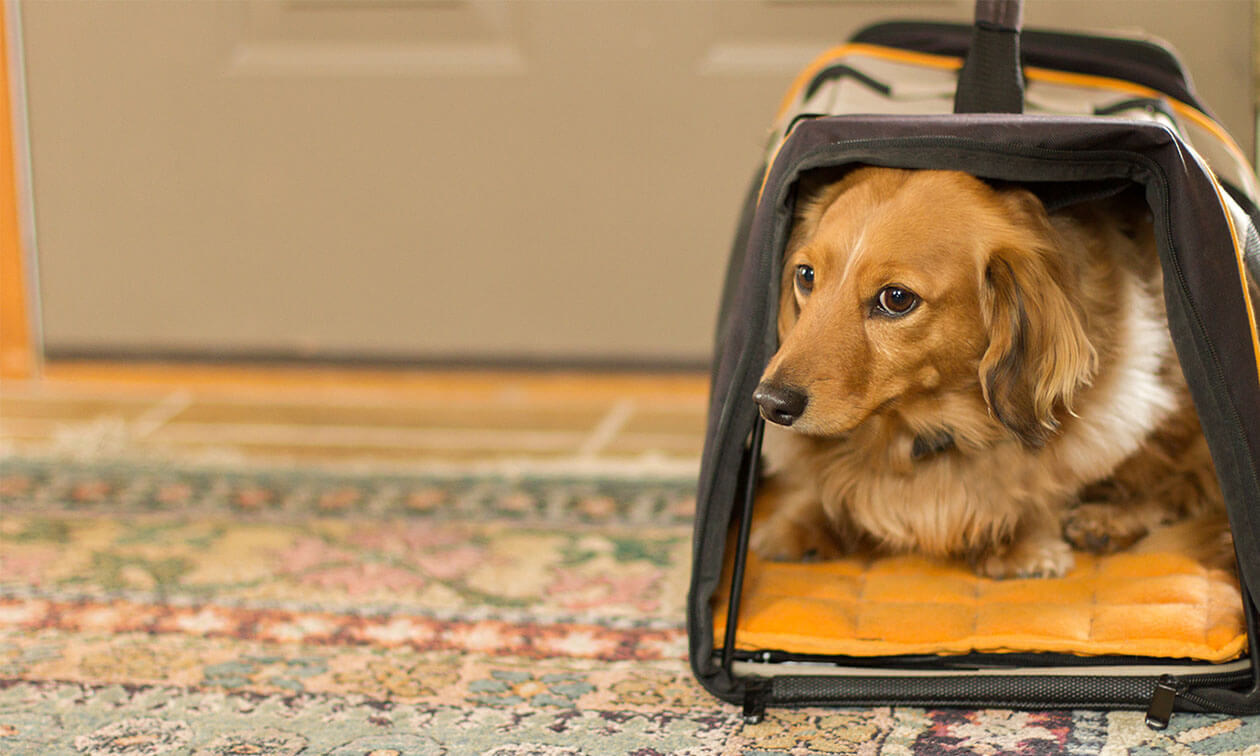Traveling with a dog can be a rewarding and enriching experience, but different breeds of dogs may have varying travel considerations. Before hitting the road, you'll want to consider your dog's love for car rides, their ability to adapt to different modes of transportation, size, energy level, and other characteristics that make ideal travel companions.
Whether you're planning a summer car trip, flying in-cabin for the holidays, or navigating public transportation, we've got you covered with some helpful tips to make the journey easier. Let’s dive in and find the perfect travel partner for your adventures!
Size and Energy Matter
Besides fitting comfortably in various modes of transportation, smaller and medium-sized dog breeds have other advantages when it comes to travel. They are lighter to carry and require less space, whether you’re staying in a hotel room or exploring the great outdoors. Some hotels may even have a specific weight limit for dog guests. Larger breeds can pose challenges in terms of accommodation restrictions and transportation logistics. Opting for a more "portable" sized dog ensures convenience and flexibility throughout your adventures.
Also consider how much activity and mental enrichment your dog needs. Long journeys in confined spaces can be difficult for high-energy breeds that like to run and play, while low-energy dogs love nothing more than to nap all day.
If you’re traveling with a large or high-energy dog, try to schedule frequent stops to allow them to stretch their legs and get some energy out. Research your lodgings to see what kind of dog parks or dog-friendly areas are nearby.
Traveling with a Dog in a Car
When it comes to road trips, some dogs are natural enthusiasts. Other dogs can be nervous in the car or even get motion sick. Working with your dog and getting them used to being in the car on shorter rides is important for any dog before a long trip.
Look for dogs that tend to have a calm and sociable demeanor, enjoy car rides and meeting new people, and have a moderate energy level that makes them comfortable traveling longer distances.
Breeds that are well-suited for traveling by way of car include:
Any dog, no matter the breed, can suffer from car sickness or anxiety. If your dog exhibits car sickness symptoms, such as vomiting or drooling caused by nausea, discuss how to best address it with your veterinarian. If your dog has anxiety about riding in the car, work with a certified dog trainer or your veterinarian to help them feel better about car travel. This is another reason to start working with your dog on car travel before your long trip.
Taking Public Transportation with Dogs
Different modes of public transportation have different policies for dogs, not to mention how these policies vary in different cities and states. In all these scenarios, it's crucial to have a dog breed that can handle crowded spaces, navigate busy streets, and maintain a calm demeanor. You may even be required to train your dog to keep them in a carrier or pay an extra fee to have them come aboard. Small to medium-sized breeds are often welcome on trains, buses, and even in some taxis, making them great choices for city explorers.
Flying with a Dog in Cabin
Flying with a dog in the cabin requires careful consideration of their size, temperament, and the airline's regulations. The first thing you need to do before flying with your dog is read your individual airline requirements for pet travel. Also, you should try to get your pet used to the carrier they will be in during the trip, as well as being around crowds before the trip.
Most importantly, you should speak with your veterinarian prior to flying with your pet. You will need to have them make sure they are healthy to travel, current on vaccines and are on a flea/tick preventative. Your dog may also need a health certificate to fly.
Flat-faced dogs should only travel in the plane's cabin, as travel in cargo can be especially dangerous. Even then, flat faced breeds can have problems in the cabin so check with your veterinarian on what would be best for your dog. Some small dog breeds that are best suited to in-cabin travel include:
Remember to check with your airline for specific requirements and restrictions to ensure a smooth journey. Airlines will have a weight limit of pets allowed to fly in the cabin. Many airlines have updated their rules about companion animals in the cabin, and some restrict access to service animals only. If your dog does not meet requirements or is too large to fly in a cabin, you can use private airline transport services specializing in safer airplane travel for pets or your pet may have to fly in cargo.
Climate Considerations
When traveling to warmer climates, it's crucial to choose a dog breed that can handle the heat and humidity. Some breeds are more heat-tolerant than others, making them better equipped for outdoor activities in hotter destinations. This is often determined by coat type, breed origin, and history. Look for single-coated dog breeds, such as Chihuahuas or Italian Greyhounds. Some longer-coated dogs can do well in hot weather if they get regular brushing, such as Havanese, originally from Cuba. Flat faced dogs will sometimes struggle more in the heat.
Always remember to provide plenty of fresh water and shade for your dog to stay hydrated and cool, and never leave your dog in the car during warm temperatures.
Medical Considerations
Calming Medication
Traveling can be stressful, even for seasoned travelers. Consider using pheromones to take the edge off the hustle and bustle or any delays. For dogs who aren't accustomed to traveling or have general anxiety, consult with your veterinarian about prescription medications to help relax and calm them.
GI Concerns
Traveling can cause stress, and stress can negatively impact your dog's gastrointestinal tract. Be sure to bring your pet’s own food to avoid any changes and talk to your veterinarian if your dog has a sensitive stomach.
Veterinary Evaluation
If your dog has medical issues, have them evaluated by your veterinarian before leaving to be sure they are doing well and are cleared for the types of travel and activity you'll be doing. Ask if the method of travel is a concern. For example, could your dog have a negative reaction to high altitudes if they have a heart issue?
Medical Care on the Go
Be sure to carry all pertinent medical records and find a veterinary hospital in the area where you'll be staying in case of an emergency. In many cases, you may need a health certificate to travel.
Medications
Keep your dog's medications with you and not in a checked bag. Bring extra medication or be sure you can refill it if something happens.
Food
When possible, have food delivered to your destination so you don't have to pack as much. Pack plenty so you won't run out and risk gastrointestinal issues from suddenly switching their diet to whatever's available. It is always good to carry some of their prescription diet and a collapsible bowl in your hand luggage in case you experience any delays.
Finding the best dog for traveling ultimately depends on your specific travel plans, preferences, and the characteristics of your four-legged companion. There is no breed that is specifically better for traveling than other breeds because it depends more on the individual animal. Getting your dog used to travel and taking the right health precautions when you travel is key. Consider the size, temperament, energy level, and heat tolerance of the breed you choose. With the right travel companion by your side, you can create unforgettable memories together while exploring new destinations. Pack your bags and get ready for an exciting adventure with your canine co-pilot!
ZPC-02718



